Black Watch [ Content Tag Results ]
Below is a list of the history pages, personal accounts, extracts and photos that have been tagged with a reference to 'Black Watch'...
Tag references
Divided into content type :
1. [ battalions ]
Black Watch
A brief history
2. [ battalions ]
Pipes and Drums
A brief history

3. [ history ]
WWI
1914 - 1919
A brief outline of 51st (Highland) Division in the First World War 1914 - 1919

4. [ history ]
Battle of Ancre
Nov 1916
A description of the battle of Ancre in November 1916 which, for the 51st Highland Division, will be remembered as the Battle of Beaumont Hamel.
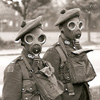
5. [ history ]
Mobilisation & WWII
Late 1938 - Jan 1940
From the "call out" of the TA in late 1938 to embarkation at Southampton for Le Havre in January 1940.
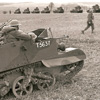
6. [ history ]
The B.E.F.
Jan - Jun 1940
The 51st Highland Division landed in Le Havre in January 1940 as part of the British Expeditionary Force [B.E.F.] On 28th March they were deployed into the defensive line relieving the French 21st Division between Bailleul and Armentiéres...
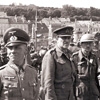
7. [ history ]
St. Valéry
June 1940
General Fortune considered all the options, a counter attack, further resistance, retaking the town but against this there was no possibility of evacuation or support, the men were exhausted and virtually out of ammunition, with no artillery ammunition at all. Shortly before 1000hrs on the 12th June General fortune took the most difficult of decisions - to surrender...

8. [ history ]
Battle of El Alamein
Oct 1942
Montgomery was determined to attack the enemy using his infantry to create a gap and then push the armour through the gap created. The area for this was not the weaker sector in the south but the stronger part of the enemy position in the North. 30 Corps were to execute this attaching on a frontage four divisions wide...
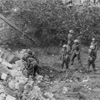
9. [ history ]
In Pursuit
Nov 1942 - Jan 1943
After El Alamein the 51st Highland Division were in pursuit of Rommel and the retreating forces from Tubruk to Misurata
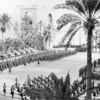
10. [ history ]
Tripoli
Jan 1943
The 51st Highland Division moved along the cost with the New Zealand Division and 7th Armoured Division carrying out a flanking attack. Failure to succeed in occupying Tripoli would cause Montgomery to have to fall back...

11. [ history ]
The Mareth Line
March 1943
The Mareth line was formed at the narrow point between the coast and the Matmata hills. The plan was to smash the Mareth defensive lines through the Matmata Hills into the Gabes Gap, which would later be the area of the battle of Wadi Akarit.

12. [ history ]
Wadi Akarit
Apr 1943
The battle of Wadi Akarit took place in a narrow coastline strip between the sea and the coastal towns of Gabes and El Hamma. Between these was the Gabes gap. The Wadi Akarit ran across the gap at the coastal end and to the Roumana Ridge inland and to the west. This area was the objective for the 51st Highland Division...

13. [ history ]
The Landing
10th July 1943
Initial phase of Op. Huskey - the landing at Sicily, 10th July 1943
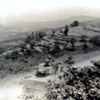
14. [ history ]
VIZZINI and FRANCOFONTE
13th - 15th July 1943
Details of the action at VIZZINI and FRANCOFONTE, Sicily, 13th - 15th July 1943
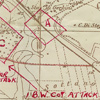
15. [ history ]
Battle for Gerbini
18th-21st July 1943
The Battle for Gerbini took place between 18 - 21st July 1943.

16. [ history ]
Sferro Hills
Jul/Aug 1943
Description of the Battle for the Sferro Hills, late July - early August 1943
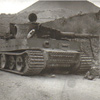
17. [ history ]
After Sferro
Aug-Sep 1943
A description of events after the Battle for the Sferro Hills, Aug-Sep 1943
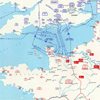
18. [ history ]
Normandy
Nov 1943 - Jul 1944
The 51st Highland Division landing took place to the west of the Ornnemouth in the 1st Corps area and crossed the River Orne. The operations in the following weeks were some of the worst the Division had experienced...
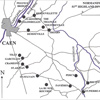
19. [ history ]
The Triangle
June-July 1944
after initial operations by 5th Black Watch against the area of Douvres, 153 Brigade followed by 152 Brigade crossed the Orne to operated to the east of the Orne and north east of Caen centred on an area known as the Triangle...
20. [ history ]
The "Island"
4-6th Nov 1944
The 53rd Division had been task with the operation to clear the "Island" were moved to support the US sector against a German counterattack and the task was given to 51st Highland Division. The "Island" was west of s'Hertogenbosch and was about six miles long and four miles deep formed between the Afwaterings canal and the River Maas.
21. [ history ]
La Roche
10th Jan 1945
With the successful advance of 152 Brigade to Ronchamps the Divisional right flank was secure and all was ready for the assault by 154 Brigade down the Ourthe valley to La Roche.

22. [ history ]
Subsequent Operations
12-15th Jan 1945
By 12th January the 51st Highland Division found that the opposition had become more determined. The reason for this was that the Division now threatened the main German withdrawal route of Champion - Erneuville - Ortho - Filly.
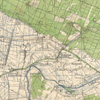
23. [ history ]
Hekkens
10-11 Feb 1945
The town of Hekkens on the southern edge of the Reichswald lay on the important intersection of the Gennep-Cleve and Kessel-Goch roads. It was also on the Siegfried Line and was therefore heavily defended with pill boxes. The town also sat on the proposed corps axis and therefore had to be cleared.
24. [ history ]
Goch
19th Feb 1945
Goch was planned as the Divisions final objective in Operation Veritable. The task fell to 153 Brigade...
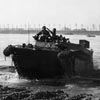
25. [ history ]
Rhine Crossing
Operation Plunder
Mar 1945
The Operation to cross the Rhine was to be called Operation Plunder. The Plan for Operation Plunder was to cross on a two corps front with 51st Highland division on the left leading 30 Corps. The Divisional objectives on the other side of the Rhine were Honnepel and Rees.
26. [ memorials ]
Ypres
Black Watch Corner
Memorial statue of a Black Watch soldier unveiled at Ypres, Belgium, to mark the centenary of the outbreak of WWI in 1914 and the First Battle of Ypres.

27. [ memorials ]
Black Watch Museum Gardens
This statue was erected to commemorate the thousands of men, both Regular Army and Territorials, who joined the 51st Highland Division from 1908 to 1967

1. [ op order ]
Op. Order Beaumont Hamel
1/6th Black Watch, Beaumont Hamel, 13 Nov 1916
Operations Order for the attack by 1/6th Battalion, The Black Watch, at Beaumont Hamel 13th Nov 1916.

2. [ extract ]
3rd Ypres Derek Bird
July 1917
An extract on The Third Ypres from Derek Bird's "The Spirit of the Troops is Excellent"
3. [ extract ]
Man of D Company
Account of The 3rd Ypres
Wauchope's "A History of the Black Watch in the Great War" quotes an account of "a man of D company" in the 6th Battalion during The Third Ypres / Passchendale
4. [ extract ]
Croix de Guerre 6th Black Watch 1918
1918
The Croix de Guerre was awarded to the 6th (Perthshire) Battalion The Black Watch for their actions in the Second Battle of the Marne which took place between 20th and 30th July 1918.
5. [ account ]
Brigadier James Oliver
A short biography from 'The Red Hackle'
Brigadier James Oliver : A short biography - an extract from 'The Red Hackle' - the Regimental magazine of The Black Watch.
6. [ account ]
Lt. Col. Honeyman, 1st BW Withdraw, St. Valery
24th May to 13th June 1940
Lieutenant Colonel Honeyman's personal account of the withdrawal of 1st Battalion Black Watch from St. Valery. The account spans from the 24th May to 13th June 1940.

7. [ account ]
Notes on Battle of El Alamein
North Africa, 1942
Detailed notes on the Battle of El Alamein from the 7th Argyll & Sutherland Highlanders. (North Africa, October, 1942)
8. [ account ]
Major (tmp. Lt. Col.) James Oliver : DSO Citation
October 1942, North Africa
Citation for the first of two DSO awarded to Major (temporary Lieutenant Colonel) James Alexander Oliver MBE of the Black Watch (Royal Highland Regiment). This first DSO is in recognition of his 'outstanding example' in the attack on the Miteriya Ridge on the night 23/24 October, 1942
9. [ account ]
7th Argylls at Wadi Akarit
Account of the Battle by Captain Cameron
Description of the The Battle of Wadi Akarit, taken from "The History of the 7th Argylls" by Captain Ian C Cameron
10. [ account ]
Defense of Point 198
6th April 1943
An account of the defense of Point 198 at Wadi Akarit on 6th April 1943. This account is taken from "OPERATION SCIPIO - THE 8TH ARMY AT THE BATTLE OF THE WADI AKARIT" by kind permission of the author B. S. Barnes.
11. [ account ]
154 Brigade - Sicily Landing
Sicily, July 1943
Account of the Sicily landing, July 1943.
12. [ account ]
Sicily - 128th Field Reg. Account
31st July 1943
A description from the History of 128th (Highland) Field Regiment R.A of the BATTLES FOR GERBINI, SFERRO HILLS, CATANIA PLAIN AND BIANCAVILLA.
13. [ account ]
Gerbini Battle 154 BDE Combs Account
Sicily, 14th August 1943
Account of the action during the Battle of Gerbini between 20/21st July 1943 by Brigadier T Rennie - Brigadier Commander 154 Infantry Brigade. (written 14th August 1943)
14. [ account ]
PIOBAIREACHD
51st Highland Division Newsletter
PIOBAIREACHD was the name given to the 51st Highland Division newsletter which was produced from 14 June 1944.
15. [ account ]
Op. Totalise, Gordon Highlanders
Gordon Highlanders War Diary, August 1944
Extract from 5th/7th Gordons War Diary, August 1944. Detailing Operation Totalise in Normandy.
16. [ account ]
Account of Operation "Totalise"
Normandy, August 1944
An account of Operation "Totalise" in Normandy by Major A McKinnon MC 7th Argylls. (written 23rd August 1944)
17. [ account ]
THE ATTACK ON LE HAVRE
September 1944
An Account of the attack on Le Havre (September 1944), taken from "History of the 7th Aryglls" by Ian C Cameron.
18. [ account ]
154 Brigade at Dunkirk
Sept - Oct 1944
Extract from 'The History of 154 Brigade in North West Europe', Dunkirk 23rd September 1944 to 9th October 1944. (Return to St. Valéry)
19. [ account ]
Attack on St. Michels Gestel and Vught
October 1944
Account of the Attack on St. Michels Gestel and Vught - taken from "The History of the 7th Argylls" by Captain Ian C Cameron
20. [ account ]
CROSSING OF AFTERWATINGS CANAL
5th Black Watch, Nov 1944
An account of the 5th Black Watch crossing the Afterwaterings Canal, 4th - 5th November 1944. From "The Spirit of Angus" by John McGregor by permission of The Black Watch Museum.
21. [ account ]
Account By Major Pilcher, 5th Black Watch
The Ardennes, January 1945
An Account By Major Pilcher, Officer Commanding C Company, 5th Black Watch of action during the later part of the action seen in the Ardennes. Major Pilcher MC, is now a Trustee of the 51st Highland Division and Ross Bequest Fund. His account picks up events starting on 12th January 1945.
22. [ account ]
Account By Private Tom Renouf - Attack on Hubermont
The Ardennes, January 1945
An account by Private Tom Renouf - 'A' Company, 7th Platoon, 5th Black Watch - of the attack on Hubermont. His account picks up the operation on the 12th January 1945. (The Ardennes, Subsequent Operations)
Dr. Tom Renouf is the Secretary of the 51st Highland Division Veterans Association.
23. [ account ]
Attack on Goch, 5 Black Watch
Goch, Reichswald, 18th February 1945
John McGregor's account of the attack on Goch (Reichswald) by 5th Black Watch on the 18th February 1945 - taken from "The Spirit of Angus" by John McGregor.
24. [ account ]
The Capture of Goch, 1st Gordons
Goch, Reichswald, 18th February 1945
Martin Lindsay's account of the attack on Goch by 1st Gordons on the 18th February 1945 - from 'So Few Got Through' by Martin Lindsay. (Goch, Reichswald)
25. [ account ]
Capture of Goch, concluding operations
Goch, Reichswald, 20th - 28th Feb 1945
Capture of Goch and concluding stages of Operation Veritable - taken from "The history of the 154 Infantry Brigade in North West Europe". (Goch, Reichswald)
26. [ account ]
153 Brigade - Operation Plunder - Rhine Crossing
March 1945
153 Brigade Operations during Operation Plunder - the Rhine Crossing, March 1945.
27. [ account ]
154 Brigade - Operation Plunder - Rhine Crossing
March 1945
An account of 154 Brigade's crossing of the Rhine in Operation Plunder, March 1945. This extract is taken from the 154 Brigade History.
28. [ account ]
152 Brigade - Operation Plunder - Attack on Groin
Late March 1945
152 Brigade Operations during Operation Plunder - the Rhine Crossing - and the attack on Groin
29. [ account ]
Appreciation of Major General Rennie
The Rhine Crossing, March 1945
Appreciation of Major General T. G. Rennie, C.B., D.S.O., M.B.E. written on 31 March by the Commandeer of the 2nd Army, Lieutenant-General Sir Miles Dempsey. Major General Rennie was killed by a shell during Operation Plunder - The crossing of the Rhine. March 1945.
30. [ account ]
154 Brigade - Final Brigade Operations
1st - 5th May 1945
154 Brigade account - 1st May 1945 to 5th May 1945.

3. [ photo ]
Men of Black Watch in a trench, c1914
c 1914 / 15
Men of Black Watch in a trench. c 1914 / 15

4. [ photo ]
Black Watch, Fricourt-Albert Road
August 1916
Photograph showing the Black Watch marching back along the Fricourt-Albert road led by pipers. Aug '16

5. [ photo ]
Op. Order 149 Map
Beaumont Hamel, 13th Nov 1916
This photograph shows the reference map of German trench positions and objectives described in Operation Orders No. 149 for the attack by 1/6th Battalion, Black Watch, on Beaumont Hamel, 13 November 1916. The original is held at the Black Watch Museum.

6. [ photo ]
Op. Order Beaumont Hamel
1/6th Black Watch at Beaumont Hamel, Nov 1916
This photograph shows Operation Orders for the attack by 1/6th Battalion, The Black Watch, at Beaumont Hamel on 13 Nov 1916. The original is held within the archives of the Black Watch Museum and is too delicate and worn in places to read easily, however, the text has been retyped and can be read from our WWI > Battle of Ancre history section. A map that accompanied the order can also be viewed there.

7. [ photo ]
Croix de Guerre
6th Black Watch 1918
The Croix de Guerre was awarded to the 6th Black Watch for their actions in July 1918 in the Second Battle of the Marne.

8. [ photo ]
6th BW back to St. Imoges
25 July 1918
Men of the 6th Black Watch resting by the roadside on the way back to St. Imoges after the capture of the Bois de l'Aulnay, 25 July 1918, Battle of Tardenois. By kind permission of the IWM.

9. [ photo ]
Captain 6 BW, Battle of Tardenois
25 July 1918
Men of the 6th Black Watch about to encamp in woods near St. Imoges after the capture of the Bois de l'Aulnay, 25 July 1918, having been relieved by the French. By kind permission of the IWM.

10. [ photo ]
Black Watch Museum Display
WW2 51st Highland Division Display
A display cabinet from the Black Watch Museum, Perth, showing WW2 artifacts relating to the 51st Highland Division.
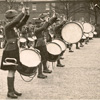
11. [ photo ]
Massed Bands of 51HD at Aldershot 1939
Aldershot 1939
Massed Pipes and Drums of the 51st Highland Division in Aldershot in 1939 - from the collection of Pipe Major A Duthie, formerly The Black Watch.
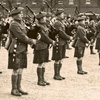
12. [ photo ]
Massed Bands of 51HD at Aldershot 1939
Aldershot 1939
The massed Pipes and Drums of the 51st Highland Division in Aldershot in 1939 - from the collection of Pipe Major A Duthie, formerly The Black Watch.

13. [ photo ]
George Drummond
c.1939
We were sent several photographs of George Watt Drummond by his Niece (Beth Marshall). This photograph appears to have been taken before George left for France in 1939 with 4th Black Watch, as part of the B.E.F.

14. [ photo ]
7 Black Watch Flag
North Africa Campaign, 1942-43
7th Black Watch flag flown during the North Africa campaign, 1942-43. Part of the collection on display at the Black Watch Musuem, Perth. The flag carries the tactical identification number of the Battalion together with the formation badge of the 51st Highland Division.
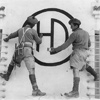
15. [ photo ]
Black Watch Soldiers Painting Insignia
Privates James Bruce and Alex McMichell living up to the nickname of the "Highway Decorators". This nickname given to the division by other divisions who became used to discovering the "HD" insignia painted wherever the Highlanders had passed through.
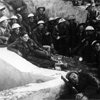
16. [ photo ]
5th Black Watch - Battle of Hons
January 1943
A group half an hour after the Battle of Hons, January 1943.

17. [ photo ]
Simon Ramsay's Labour Squad
January 1943
7th Black Watch : Simon Ramsay's labour squad preparing bypass to blown bridge near Leptis Magna on the way to Hons

18. [ photo ]
7th Black Watch - Victory Parade, Tripoli
7th Black Watch
Victory parade by 7th Black Watch after Tripoli was captured on the morning of 23rd january 1943.

19. [ photo ]
Major General Wimberley MC, GOC 51st HD
1943
Major General Wimberley, MC, GOC of the 51st Highland Division discusses a point on the map with one of his officers at Divisional Headquarters.
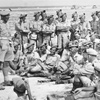
20. [ photo ]
5th Black Watch Briefing
Gabes, Tunisia, April 1943
Major John Mcgregor briefs B Coy of the 5th Black Watch at Gabes, Tunisia, April 1943.

21. [ photo ]
Diagram of Battle of Wadi Akarit
April 1943
Diagram of the Battle of Wadi Akarit, from "The History of the 51st Highland Division" by J B Salmond
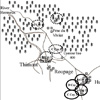
22. [ photo ]
Map - Attack on Hubermont
12-13 January 1945
Map showing the details of the 5th Black watch attack on Hubermont. The attack took place the night of 12-13 January showing the initial (1) and final (2) company positions.

23. [ photo ]
Bren Gunner, Feb, 1945
14 February 1945
Bren gunner in action from a window of a house when they were observing and giving covering fire for their comrades advancing below. C Coy, 5 Black Watch, 153 Brigade. Sgt Silverside 14 February 1945
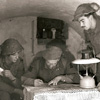
24. [ photo ]
Underground HQ, Gennep
14 February 1945
"Life for the most part is underground in Gennep. The Germans are still making the town, which was a key place in their water defence line, an unhealthy place to live in, and shell it regularly. 'C' Company Commandeer, Major GA Pilcher MC of GOWS, Invergowerie, nr Dundee (centre) utilises one of the German built cellars as his HQ. With him is his 2nd in command, Captain AL Campbell of 9 Woodburn square, Douglas, Isle of Man (right) and 13 Pl Commander, Lt D P Smyth of 38 Herriot Row, Edinburgh. C Coy, 5 Black Watch, 153 Brigade" - Words and Photograph by Sgt Silverside, 14th February 1945.
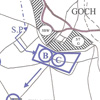
25. [ photo ]
1st Gordons attack on Goch
18TH FEBRUARY 1945
This detailed sketch map accompanies the account from "So Few Got Through" by Martin Lindsay

26. [ photo ]
A Buffalo comes ashore, Rhine, 1945
Rhine, March 1945
1st Black Watch, Buffalo comes ashore.
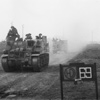
27. [ photo ]
Black Watch and Kangaroo
23rd March 1945
On the night of 23rd March 1945 men of the three Black Watch battalions in the 51st Highland Division were ferried across the Rhine under cover of artillery barrage and a massive smoke screen. They are seen here moving forward in 'Kangaroos'. The HD 69 signifies the 7th Battalion. Little opposition was met before they were established on the far bank. The credit for being the first British troops across the Rhine fell to this battalion. The term 'Kangaroo' was applied to converted tanks and gun platforms like the hulls of Shermans and Priests which were converted into infantry armoured personal carries from Normandy onwards.

28. [ photo ]
Tom Renouf remembers fallen
Remembering the fallen
Tom Renouf remembers the fallen (centre) with Major Pilcher MC (right).

29. [ photo ]
Tom Renouf, Dundee
Black Watch Memorial, Dundee
Tom Renouf with fellow veteran Dougie Roger at the Black Watch Memorial in Dundee.

30. [ photo ]
Black Watch Corner Memorial
A statue of a Black Watch soldier has been unveiled in Belgium to mark the centenary of World War One. The bronze statue, designed by Edinburgh sculptor Alan Herriot, was installed in front of 300 regimental veterans at Black Watch Corner.

31. [ photo ]
Victoria Schofield Cover
by Victoria Schofield
"The Black Watch - Fighting in The Front Line 1899-2006" by Victoria Schofield, published in 2017 by head of Zeus Ltd. (also available from The Black Watch Museum)

32. [ photo ]
Blackwatch Garden Statue
Memorial to the 51HD
This statue was erected to commemorate the thousands of men, both Regular Army and Territorials, who joined the 51st Highland Division from 1908 to 1967

33. [ photo ]
Blackwatch Garden Statue
Unveiled 21st June 2017
This statue was erected to commemorate the thousands of men, both Regular Army and Territorials, who joined the 51st Highland Division from 1908 to 1967.

34. [ photo ]
Blackwatch Garden Statue 2
Memorial to the 51HD
This statue was erected to commemorate the thousands of men, both Regular Army and Territorials, who joined the 51st Highland Division from 1908 to 1967


